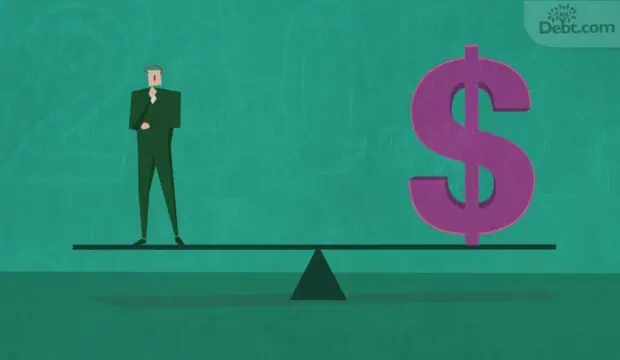Last October, the U.S. Government reported credit card balances hit a record-high $1 trillion in the summer of 2023.[1] More than 8 in 10 Americans use credit cards, with many holding a balance of $5,700 by the end of last year.[2]
Most Americans may carry a credit card balance from month to month. Many don’t know, however, that it is possible to negotiate their balances down. Here’s a video explaining credit card debt negotiation works…
Negotiating credit card debt
If you’re drowning financially and need help with credit card bills, you may wonder if it’s possible to negotiate your credit card debt. Options may include a partial settlement, a workout agreement, or even payment reduction for a few months.
There are key steps to negotiating credit card debt, but they’re not simple. You’ll have to find a plan that works for you when trying to negotiate credit card debt. Options include a workout arrangement, forbearance, debt management plan and debt settlement.
Debt settlement program
With a debt settlement program, you negotiate a settlement for less than the full amount owed. The credit card debt negotiation depends on whether or not the individual creditor will work with you. And you need to understand that paying less than you owe impacts your credit score and some forgiven debt is viewed as income and may have tax consequences.
Debt management program
With a debt management program, a certified counselor negotiates credit card debt arrangements for you. You’ll pay back your principal in-full, but your interest rates are reduced or even eliminated. Late fees and penalties may be waived. You’ll only have one payment to make each month instead of several. Your credit score stays intact and may even improve while on the program. The key to a successful debt management program is that more money goes to eliminating the principal, while high interest rate charges end.
Workout arrangement
With a workout arrangement, the bank may eliminate or lower both your interest rate and minimum monthly payment, and they will often stop assessing late fees or over-limit charges. If you go this route, your credit line will likely be cut off and the impact to your credit score will depend on how the issuer reports the credit card debt negotiation arrangement to the credit bureaus.
If your financial problem is only temporary, such as a medical event that puts you out of work for a few months, then your credit card negotiation could take shape as a forbearance. A forbearance offers a brief break from full payment, not forgiveness. This is intended to be a bridge from financial stress to financial stability.
Although you may hear that creditors won’t work with you until you’re already behind on payments, the responsible thing to do is seek help as soon as you realize you’re in a financial bind. If it’s a short-term problem, try calling the creditor yourself. Explain your situation and ask for forbearance. If it’s a long-term problem, such as a divorce or the death of the primary breadwinner, then you likely need debt management or debt settlement help from experts.
To help figure out what options might work for you, fill out our form to set up a consultation, or better yet, call us so we can help find the best solution for your situation. We are A+ rated by the Better Business Bureau and have helped thousands of people become financially stable. So, don’t struggle any longer. Give us a call. When life happens, we’re here for you.
Handling debt negotiation on your own
When it comes to credit card debt negotiation that the first thing you need to think about is why you are in debt, the CFPB says.[3] Is it a temporary job loss or long-term issue? Understanding how long you might be in this situation can be helpful when you call your creditors to negotiate.
Some credit card companies offered deferment. Deferment allows you to temporarily stop making payments for a set period. Some creditors even allowed customers to extend deferment between 3-6 months.
Many creditors are less flexible with customers. But it still may be possible to negotiate for an extra deferment period or to extend your current deferment agreement.
Take these steps to prepare for credit card debt negotiation
- If you have at least some income trickling in, review your budget to see how much you can reasonably afford to pay.
- Cut expenses back to bare bones. Think of this as a guerilla budgeting period, where you only pay for bills and absolute necessities.
- Also, write down what steps you’re taking to restore your income if it was cut.
- Are you working side gigs until you find full employment?
- How many jobs are you applying to per week?
- When do you believe you can reasonably expect to resume full-time work?
Now you’re ready to call your credit card companies to negotiate
Now you’re armed with all the information you need to make an effective case. Have all this information written out and on hand when you start contacting your credit card companies. Then take these steps:
- Start by asking to extend the deferment period outright. Explain your situation and offer a time when you believe you will be able to resume payments. Make sure it’s realistic because if not, you may negotiate yourself out of another extension.
- If they won’t pause your payments, ask for forbearance. Forbearance is similar to deferment, except instead of pausing your payments, you simply reduce them for a time. Be honest about what you can reasonably afford to pay and be willing to go through the numbers with them to prove your case.
- As a last resort, ask for a workout arrangement. A workout arrangement is basically a credit card payoff plan. Your creditor will freeze your account, so you won’t be able to make any new charges. In exchange, they with reduce or eliminate interest and penalties, as well as reduce your payments. This allows you to pay off the balance you owe, then the account will be closed.
If a credit card company is still unwilling to budge, then it may be time to consider some alternative relief options.
Credit card companies won’t budge? Get help to negotiate.
Get the support of professional debt negotiators
When creditors aren’t willing to work with you, then it’s time to call in the professionals. There are two types of services that can help in this case — credit counseling and debt settlement services.
Credit counseling
Credit counseling services are nonprofit organizations that assist people who need help negotiating with creditors. These organizations have established relationships with creditors. In fact, they’re funded by grants from credit card companies that use these services to help customers who may end up defaulting and not paying what they owe.
That established relationship works in your favor. The credit counseling service helps you find a payment you can reasonably afford on your current budget. Then they contact your creditors to let them know you’re working with them. Since you’re getting that professional help, creditors will lower or eliminate your interest rate and stop penalties. They also agree to accept payments through the credit counseling service.
If creditors aren’t willing to work with you, they still may offer a workout arrangement if you set it up through a credit counseling agency. The thought is that because you are getting professional help, you are more likely to stick with the agreement and pay your debt back. Your credit cards will still be frozen and closed, but you can at least get out of debt in an affordable way that works for your budget.
Even better, the debt management program that the agency will help you set up won’t damage your creditor report. And if you have past-due accounts, most creditors will agree to bring those current after three payments on the program.
Credit card debt settlement
The second, more drastic solution for professional credit card debt negotiation can help when you’re completely overwhelmed. Debt settlement is when you pay the company less than what you owe. Forget interest and penalties, you only pay off a portion of the principal (the actual debt you owe).
This is something you can try to negotiate with creditors on your own, but you may have limited success. Getting professional debt negotiators on your side is usually the way to go. These experts know how to negotiate to get you out of credit card debt for the least amount possible.
This will mean your credit will take a hit. Each debt you settle will be noted on your credit report for seven years from the date the account first became delinquent. However, if you’ve already started to miss payments, that damage will also be sticking around for seven years, so it may be worth it to settle.
Some real examples of what debt negotiators can do for you
Debt.com works with a network of debt relief providers, including the two types of professional debt negotiators that we described. Let’s look at two examples of real people that worked with a professional debt negotiation team. Both people had similar amounts of debt, but different needs and goals.
Mary gets results with a debt management program
Mary owed $30,440 in credit card debt. She was only making minimum payments but had managed to maintain a fair credit score. She didn’t want to damage her credit any further as she negotiated her debt.
Mary worked with a nonprofit credit counseling agency to set up a debt management program. Here’s what the credit counseling team negotiated for her:
- Her total credit card payments were reduced by 35 percent — her monthly payment went from $1,217 to $794
- The team worked with her creditors to reduce her interest rates to an average of 6.7%.
- As a result, Mary saved $13,319 as she paid off her debt
- She was out of debt in 3 years and 8 months
Mary didn’t suffer any damage to her credit, she saved money and got out of debt much faster than she could have on her own.
Nole saves big with debt settlement negotiators
Nole also owed just over $30,000 — $30,093 to be exact. But unlike Mary, Nole wasn’t worried about protecting his credit score. it was already bad because he was behind on most of his credit card bills. Nole just wanted to get out of debt as quickly as possible for the least amount of money possible.
So, Nole worked with a professional debt settlement team. They negotiated with his creditors on his behalf and here’s what happened:
- Nole paid just 55% of what he owed on each debt, on average
- He got out of debt for $18,548 total
- What’s more, he got out of debt in just 23 months, so he was debt-free in less than two years
Keep in mind that Nole did suffer some credit damage as a result of settling his debt. Each debt settled will be noted on Nole’s credit report for seven years from the date the account first became delinquent. But since Nole had missed payments and delinquencies already, this was something he was willing to deal with.
What can a professional debt negotiator do for you?
These are just two examples of people who were in debt but got out of it faster with the help of a professional debt negotiation team. Debt.com works with top-rated providers that offer a variety of solutions to fit your needs. If you can’t get creditors or collectors to work with you, then maybe it’s time to get a team that will.
Connect with the right experts for credit card debt negotiation.
Negotiating with creditors when things aren’t going wrong
Even when you’re not having trouble keeping up with bills, you can still benefit from credit card debt negotiation. There are benefits that you can negotiate when things are fine with your account. These can help you avoid fees and save money by minimizing interest.
Here are some good reasons to call your credit card companies when your account is in good standing:
Lower interest rates
If you’re a loyal customer that consistently pays their bills on time and you have good credit, you can ask the company to lower your interest rate. Even if the company is not willing to permanently lower your rate if you call they will often offer a promotional rate that’s much lower than what you’re getting charged now. This can be invaluable if you have a balance to pay off because more of each payment you make will go towards paying down the balance.
Adjusting your payment due date
Another useful thing you can negotiate with a credit card company is to move your payment due date. This can make it easier to balance your budget by making sure bills are spread evenly throughout the month. Most credit card companies will allow you to adjust the payment due date by up to 14 days. Simply review your bill pay schedule and determine the best time to move a bill, then call the creditor to ask.
Good faith removal of a late fee
If you make a one-time mistake and forget to pay your bill, you will get popped with a late fee. Late fees average $45 on credit cards, so it’s no small charge. If you’ve never missed a payment before this, call the company and ask if they’d be willing to waive the late fee for this first-time offense. Then make sure you never miss another payment by setting up AutoPay.
Refunding international transaction fees
Some credit card companies will refund international transaction fees charged when you use your card while traveling internationally. These fees can quickly add up, so if you forgot to check your policy and get a surprise on your next statement when you return home, call and see if they will waive those fees.
Waiving annual fees
If your credit card has an annual fee, there are rare occasions where you can get the company to waive this fee. This can be especially useful if you don’t use the card often and plan to close the account. Call them and tell them you want to cancel the card and they may offer to waive the annual fee to keep you as a customer. It may only work for a year, but that gives you a year to use the card and enjoy its perks without the added price tag.










